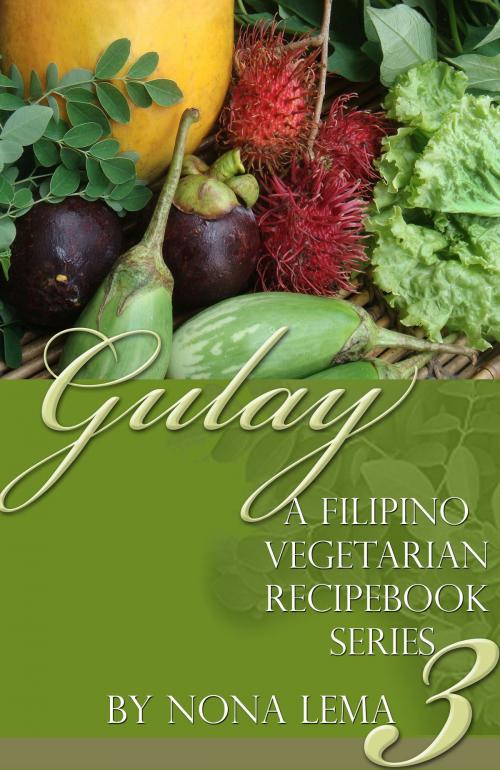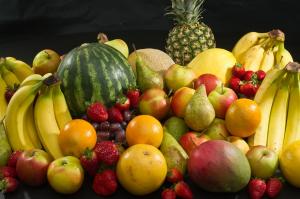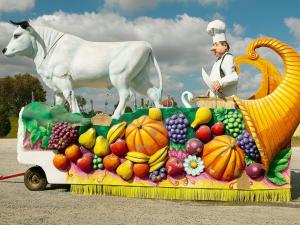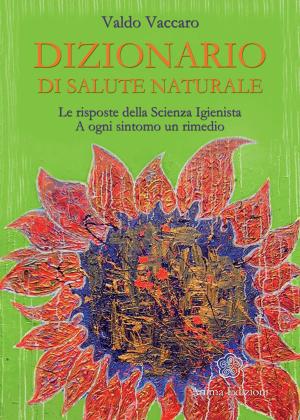Gulay Book 3, A Filipino Vegetarian Recipebook Series
Nonfiction, Food & Drink, Vegetarian, Health & Well Being, Health, Healthy Living| Author: | Nona Lema | ISBN: | 9781301175093 |
| Publisher: | Nona Lema | Publication: | September 28, 2012 |
| Imprint: | Smashwords Edition | Language: | English |
| Author: | Nona Lema |
| ISBN: | 9781301175093 |
| Publisher: | Nona Lema |
| Publication: | September 28, 2012 |
| Imprint: | Smashwords Edition |
| Language: | English |
Gulay is a Filipino vegetarian recipebook series written by the best-selling author Nona Lema. It is so aptly named because ‘gulay’ in the Filipino language means ‘vegetable’. This recipe book series comes from the Philippines, a beautiful country in Southeast Asia with more than 7,000 scenic islands.
Gulay features traditional Filipino cuisine cooked the vegetarian way. Recipes are easy to follow and present Nona’s style of cooking that is simple, homey and delicious. The tastes and flavors may be appreciated by everyone.
Gulay is just what you will love in a vegetarian cookbook: it transports you into the heart and soul of a culture that is so rich in culinary heritage. The true Filipino fare is actually a unique blend of east and west - - with very strong Spanish, Mexican, and Chinese influences. Many of the recipes are time-honored cooking traditions the Filipino people have inherited. After 300 years of Spanish colonization, Filipino favorite meat and vegetable stews such as Menudo, Caldereta, Afritada or Mechado have something of the delicious taste of Mediterranean food. This may be seen in the generous use of rich and savory tomato sauce and olive oil. Nona shows how these classic Spanish-inspired dishes can be cooked the healthy meatless way.
Two and a half centuries (16th-18th century) of galleon trade between Manila, Philippines and Bahia de Acapulco, Mexico have also brought tremendous influence. Thus, Mexican soups such as Sopa de Albondigas, Sopa de Ajos, Sopa de Picadillos; and main dishes such as Adobo and Adobado, have crept into the Filipino food and stayed on till today. Nona shares the vegetarian versions of these recipes too.
The ancient Chinese traders came to the Philippine shore as early as the 11th century, long before the Arabs or the Spaniards came. They introduced their ancient vegetarian food culture that centered on rice, soybeans and Chinese vegetables. Thus, the Filipinos learned how to eat tofu or tauho, taho, tahure and soy sauce; all kinds of noodles made from rice and wheat; and Chinese vegetables like pe tsai or pechay (Chinese celery cabbage), bok choy or kangkong (water spinach), sitcharo (snow peas), toge (mungbean sprouts), spring onions, young corn and green beans.
GULAY is all about the joy of Filipino vegetarian cooking. In the absence of meat, fish and eggs, the flavor is provided by the variety of fruits, vegetables, beans and grains. The Philippines is a land of many wonderful mouth-watering dishes - -everything from soups to desserts. Discover and taste for yourself the different kinds of pastillas, cremas and jams; the wide variety of kakanin (rice cakes and kalamay, bibingka and ginatan) and enjoy real, hearty vegetarian home-cooked main meals.
GULAY is handsomely done, informative and well-written. Whether you have thought about going vegetarian or have already taken the plunge, it makes an excellent addition to your cookbook collection.
Gulay is a Filipino vegetarian recipebook series written by the best-selling author Nona Lema. It is so aptly named because ‘gulay’ in the Filipino language means ‘vegetable’. This recipe book series comes from the Philippines, a beautiful country in Southeast Asia with more than 7,000 scenic islands.
Gulay features traditional Filipino cuisine cooked the vegetarian way. Recipes are easy to follow and present Nona’s style of cooking that is simple, homey and delicious. The tastes and flavors may be appreciated by everyone.
Gulay is just what you will love in a vegetarian cookbook: it transports you into the heart and soul of a culture that is so rich in culinary heritage. The true Filipino fare is actually a unique blend of east and west - - with very strong Spanish, Mexican, and Chinese influences. Many of the recipes are time-honored cooking traditions the Filipino people have inherited. After 300 years of Spanish colonization, Filipino favorite meat and vegetable stews such as Menudo, Caldereta, Afritada or Mechado have something of the delicious taste of Mediterranean food. This may be seen in the generous use of rich and savory tomato sauce and olive oil. Nona shows how these classic Spanish-inspired dishes can be cooked the healthy meatless way.
Two and a half centuries (16th-18th century) of galleon trade between Manila, Philippines and Bahia de Acapulco, Mexico have also brought tremendous influence. Thus, Mexican soups such as Sopa de Albondigas, Sopa de Ajos, Sopa de Picadillos; and main dishes such as Adobo and Adobado, have crept into the Filipino food and stayed on till today. Nona shares the vegetarian versions of these recipes too.
The ancient Chinese traders came to the Philippine shore as early as the 11th century, long before the Arabs or the Spaniards came. They introduced their ancient vegetarian food culture that centered on rice, soybeans and Chinese vegetables. Thus, the Filipinos learned how to eat tofu or tauho, taho, tahure and soy sauce; all kinds of noodles made from rice and wheat; and Chinese vegetables like pe tsai or pechay (Chinese celery cabbage), bok choy or kangkong (water spinach), sitcharo (snow peas), toge (mungbean sprouts), spring onions, young corn and green beans.
GULAY is all about the joy of Filipino vegetarian cooking. In the absence of meat, fish and eggs, the flavor is provided by the variety of fruits, vegetables, beans and grains. The Philippines is a land of many wonderful mouth-watering dishes - -everything from soups to desserts. Discover and taste for yourself the different kinds of pastillas, cremas and jams; the wide variety of kakanin (rice cakes and kalamay, bibingka and ginatan) and enjoy real, hearty vegetarian home-cooked main meals.
GULAY is handsomely done, informative and well-written. Whether you have thought about going vegetarian or have already taken the plunge, it makes an excellent addition to your cookbook collection.















